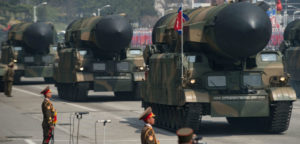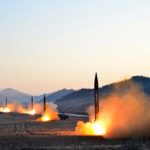
BY ,
While the EU’s foreign-policy chief tries to defuse tensions in Northeast Asia, the Trump administration is lighting fires.
European Union foreign-policy chief Federica Mogherini warned in China Thursday that the current war of words between the United States and North Korea creates “geopolitical unpredictability” not only in Asia but around the globe. But as U.S. President Donald Trump and North Korean leader Kim Jong Un face off, it’s not clear that either sees this as a sign they should back down.
Speaking at Tsinghua University as part of a three-day trip, Mogherini said she had brought up her concerns with Chinese officials in Beijing. She added that the EU and China have a common responsibility to “avoid a military escalation in the Korean Peninsula, to push for North Korea to abide by its international obligations and re-engage with the international community, and work together for a denuclearized Korean Peninsula.”
Trending Articles
If the U.S. Could Prosecute Assange, It Would Have Already…
Trump’s team has gone from cheerleading WikiLeaks to excoriating it in a matter of months, just as the Russiagate…
Powered By
While Mogherini attempted to soothe tensions, Washington was quite literally trying to meet the problem head-on. On Monday, Vice President Mike Pence was photographed at the demilitarized zone (DMZ) separating North and South Korea, staring icily into the closed-off North because, as he said later, “I thought it was important that people on the other side of the DMZ see our resolve in my face.”
Pence reiterated prior administration warnings that the era of “strategic patience” with North Korea was over, as it stubbornly pursues its nuclear and missile programs that threaten the region.
“North Korea would do well not to test [Trump’s] resolve — or the strength of the armed forces of the United States in this region,” Pence said in a press conference later that day with acting South Korean President Hwang Kyo-ahn. “All options are on the table” to confront the Hermit Kingdom, Pence added.
Mogherini’s and Pence’s statements showcased the growing rift between the EU and the United States over a spate of foreign-policy issues since Trump assumed office. In the wake of North Korea’s continued missile tests — including an unsuccessful launch Sunday — the Trump administration’s unpredictability and incendiary rhetoric meant to pressure Pyongyang have instead rattled allies in Asia and Europe.
The White House and Defense Department came under fire for misleading allies on the whereabouts of a naval strike group it said it was deploying to the Korean coast earlier this month. While Trump boasted about the U.S. “armada” stalking Korean seas, the USS Carl Vinson aircraft carrier strike group was actually more than 3,000 miles away, conducting exercises with the Australian navy.
“What [President Donald Trump] said was very important for the national security of South Korea,” South Korean presidential candidate Hong Joon-pyo said in an interview with the Wall Street Journal Wednesday. “If that was a lie, then during Trump’s term, South Korea will not trust whatever Trump says.”?
Trump compounded the gaffe when he tripped over a particularly sensitive cultural landmine, telling the Journal that South Korea had once been part of China. That sparked outrage among South Koreans and prompted an official response from the Foreign Ministry.
“It’s a clear fact acknowledged by the international community that, for thousands of years of history, Korea has never been part of China,” South Korean Foreign Ministry spokesman Cho June-hyuck said Thursday.
While the Trump administration blunders into diplomatic controversies of its own making, former U.S. government officials tried to put North Korea’s nuclear ambitions in perspective.
The regime in Pyongyang is “ruthless and reckless, but they’re not crazy,” said William Perry, a former defense secretary under President Bill Clinton.
Perry, who also served as Clinton’s special envoy to North Korea, said three generations of family rule by the Kim dynasty in Pyongyang have shared one unifying philosophy: “Keeping the regime in power.”
Kim Jong Un is unlikely to do anything that would jeopardize the dynasty. In particular, Perry said, Kim and his coterie realize that a nuclear exchange with the United States would at the very least obliterate his capital city and a good chunk of his military capability.
Perry told reporters on a conference call that he believes the North would be more likely to respond with conventional weapons against its southern neighbor if a preemptive strike were taken against its nuclear or missile facilities. Seoul sits just 35 miles from the North Korean border, where thousands of artillery pieces are dug into hard granite hills, ready to rain tens of thousands of shells on the capital within minutes.
That threat gives Pyongyang free rein for bombast. This week, the Rodong Sinmun, the official newspaper of North Korea’s ruling Workers’ Party, warned that Pyongyang could launch a “super-mighty preemptive strike” against “U.S. imperialists’ invasion forces” and reduce Washington and its allies “to ashes.”
China has become exasperated with North Korea, following a series of provocative missile tests and the assassination in February of Kim Jong Nam, the North Korean leader’s exiled half-brother, allegedly ordered by the regime. China appears to be complying more fully with U.N. sanctions on trade with Pyongyang and recently agreed to stop importing North Korean coal, a source of hard earnings for the Hermit Kingdom.
Beijing’s “level of frustration and ire directed at North Korea is unprecedented,” said Bruce Bennett, an expert on Asian security with the Rand Corp. in a press call Thursday.
But that doesn’t translate into an appetite for regime change or into taking steps that could precipitate it, Bennett said. “There’s a reluctance to push back hard — they’re afraid of what the consequences might be.”
North Korea’s latest provocation was the attempted launch of a still unidentified missile that blew up almost immediately after launch. But experts warn that with each failure, North Korea inches closer to a viable missile program and with it the capability to lob nukes at U.S. and allied territory. Since 2014, about three-quarters of Pyongyang’s missile launches (51 of 66) have succeeded, as nuclear nonproliferation expert Jeffrey Lewis noted. As tests continue, missile development continues apace, and North Korea bulks up its nuclear arsenal in the future, the threat — and the difficulty of dealing with it — will only grow.
North Korea could have as many as 100 nuclear weapons by 2025, said Michael Mazarr, another Asia security expert with Rand. “A North Korea of the mid-2020s is going to be a very different challenge than the one it is today,” he said.
Photo credit: ED JONES/AFP/Getty Images
Credit : FP Premium


